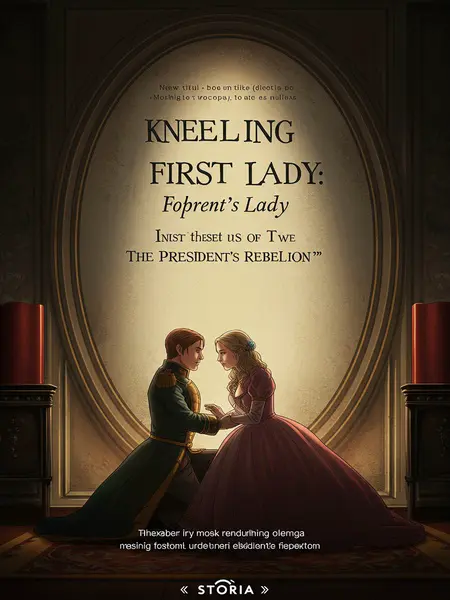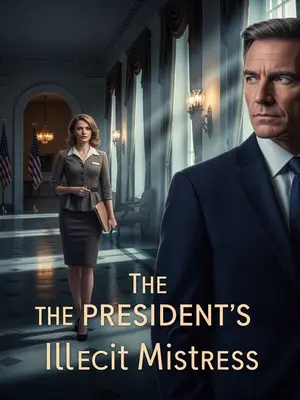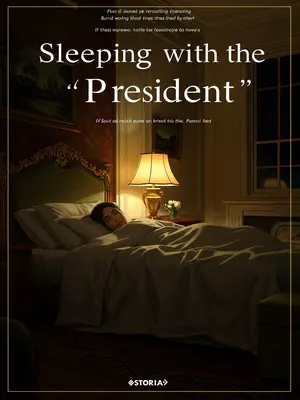Chapter 2: Kneeling in the White House
Before dawn broke over Chicago, Adam Lee blinked awake in the chill of his bedroom, despair already pressing down. The wind off Lake Michigan rattled the old sash windows, and he lay there, staring at the water stains on the ceiling. The room smelled faintly of old radiator heat and the metallic tang of city air. Far off, the wail of sirens and the clatter of an L train bled through the walls—a reminder that the world kept moving, even as his did not. The glorious era of the Old Union was long gone. Now it was the second day of October in the twentieth year of President Grant’s rule, and Adam Lee was once again marooned in a body and a world that felt both familiar and impossibly distant.
His fingers ached from gripping the mattress, as if he might slip right through to another universe at any moment. He’d grown used to the dizzying, out-of-body feeling—a sense that his soul was always half-packed, ready to bolt. There was a cold, stale taste in his mouth—the taste of memories that didn’t belong here.
What truly made him hopeless wasn’t some fleeting fever dream, or the endless parade of new administrations—
It was Mrs. Delaney’s sixtieth birthday.
The old matriarch was coming back to the White House from her lakeside estate, sightseeing and eating fruit along the way, while Grant—meaning him—was expected to put on a show of filial piety.
He could picture the whole absurd parade: the black SUVs crawling down Sheridan Road, the Secret Service sweating in suits that never fit, Mrs. Delaney’s entourage picking at hand-cut melon as the nation’s capital waited for her arrival. Filial piety, he thought, was about as out of place here as eating cereal with a steak knife.
How was he supposed to pull that off?
Early that morning, he’d head to the estate and kneel to bid Mrs. Delaney farewell. The very idea rankled. Yet that was the tradition now, ridiculous as it sounded in America. He laced up his shoes, brushed imaginary lint from his suit, and prepared for a display of respect that grated against every bone in his body.
After sending her off, he’d walk out front to lead the way, all the way to Main Street, where Mrs. Delaney would pause for the scenery, and Grant would kneel there, waiting. Once her golden carriage passed far enough, Grant would rush ahead, take a shortcut, and enter the White House through the West Wing.
The whole procession had the rhythm of a parade, but none of the joy—just the snap of protocol and the tired sighs of aides who’d seen it all before. Adam Lee would catch his own reflection in the glass doors, searching for dignity as he hurried past portraits of presidents who never knelt for anyone.
Once inside, he’d kneel again—kneeling until Mrs. Delaney arrived. The marble floor of the West Wing was icy even through his slacks. As he pressed his knee down, it slipped a little, the cold biting straight through, and he caught a staffer’s eyes flicking away in discomfort. Was this what surrender felt like? An old general reduced to a symbol, waiting for the footsteps of a woman whose word was law—like a Supreme Court verdict: no appeals, no second chances.
And who was this unfortunate Grant? Of course, it was none other than the esteemed President Lee of the Old Union. Every morning, as he opened his eyes, Adam Lee’s eyelids would twitch, thinking: How many more times do I have to kneel? How many more years must I play the dutiful grandson? Rage swelled in his chest, hot and familiar.
He’d clench his jaw until it ached, fighting the urge to hurl a lamp at the nearest wall. No one saw the trembling in his hands, or heard the curses he muttered under his breath—swallowed like bitter medicine.
Since finding himself in Grant’s body, Adam Lee had lived like this for five years.
Adam Lee: Five years—do you know how I’ve endured these five years? I was once Commander-in-Chief, General of the Armies. When have I ever suffered such humiliation?
He’d led men through cannon fire, stared down death with the flag in his fist. Now he was a figurehead—his orders filtered, his dignity chipped away, his purpose eroded one day at a time. He carried the ache in his bones, a restless anger that never quite faded.
But whenever Adam Lee closed his eyes, he saw the great fire at the Capitol, the cries of the people across the land, the countless souls of righteous patriots—all of them surged into his heart.
He could almost smell the burning; the memory pressed down like a heavy coat. The ghosts of fallen soldiers haunted the corners of his mind, whispering for justice, for action, for something more than empty ceremony.
These images had haunted him since the first day he arrived. At first, he’d been confident, thinking that with a twenty-year-old’s body, he could handle anything.
He’d relished the physical strength, the feeling of time reversed—no back pain, no gray hair. But the world’s burdens pressed down just as hard. Hope curdled into bitterness; confidence into sleepless nights.
No matter which administration fell or whose ideals were crushed, it was all within his grasp.
Yet the past, with all its blunders and betrayals, was never far. Each change in power felt like another spin on a rigged roulette wheel, the house always winning.
The history in his mind flashed by, and several events made Adam Lee furious: the Civil War, the Trail of Tears, the Burning of Atlanta, the Massacre at Wounded Knee.
He could recite those tragedies like a litany—reminders of how deep American wounds ran, how easily the powerful trampled the weak. The weight of those names made his hands curl into fists under the covers.
Adam Lee took a deep breath, thinking he had come to upend this government and restore the glory of the Union.
He pictured the flag, faded but not forgotten, rising once more in the city’s smoky dawn. He saw crowds gathering on courthouse steps, voices lifted in hope and anger. Was it foolish to believe in the Union’s return? Maybe. But it was the only dream he had left.
But he soon realized it wasn’t just the government that was as fragile as a Jenga tower after too many bad moves—the whole of America was on the brink.
Every morning’s news was a fresh punch to the gut: markets tanking, food banks overrun, gunfire in the streets of cities he’d once marched through as a hero. The system that had once seemed invincible now looked ready to collapse with a stiff breeze.
When he arrived, President Grant had just taken office, the two great foreign wars were over, and the government had signed treaties with Britain, France, Russia, even Portugal. The great powers carved up the country with knives every day—what was being taken wasn’t just gold, but the sweat and blood of a hundred million people.
He’d listened to the radio, static crackling over foreign voices, each one laying claim to another patch of American soil. The betrayal was almost physical—a tightness in his chest that never quite eased. The world seemed to shrink, the promise of freedom closing in, acre by acre.
How could the people not rebel?
He wondered how long before someone snapped. Maybe a farmer out West, fed up with taxes and foreign checkpoints. Maybe a teacher in a boarded-up school, tired of lies. The fuse was burning; Adam Lee smelled smoke everywhere he went.
After suppressing the Great Rebellion, the government launched the Reconstruction Movement, but the National Guard was a bad joke—uniforms without backbone, just collecting paychecks. Advanced weapons piled up in armories, no one knew how to use them, and after major defeats, they were simply handed over to foreign powers.
Armories became ghost towns, rifles rusting in locked cages, the only movement from rats and desperate looters. The once-mighty National Guard was a joke: men in uniform collecting checks, officers more interested in whiskey and backroom deals than defense. Adam Lee found himself tossing a pen across the desk or slamming a file drawer shut in frustration. It made him sick.
A crisis unseen in centuries, with the great powers circling, and America as fragile as a Jenga tower after too many bad moves.
It was the kind of danger that didn’t make headlines—just a slow rot that hollowed out hope, leaving only fear and resignation. The city lights seemed dimmer at night. The silence after curfew was heavy, almost funereal.
Adam Lee: …
He stared at his reflection in the bathroom mirror, the lines around his eyes deeper than before. “The difficulty level just went up, didn’t it?” he muttered, running a hand through his hair, water dripping from his chin.
Still, it’s manageable. America is vast—if only the people could be mobilized, and a few new armies trained, what is there to fear from the great powers?
He jotted plans on yellow legal pads, scribbling strategies between sips of bitter coffee. If only he could tap into the old spirit—the stubborn grit that built railroads and won wars—maybe America could stand again.
But here’s the problem: to mobilize the people, the National Guard system must be abolished, and the whole idea of the old Republic must be set aside…
He grimaced, thinking about the politics—the tangled web of loyalties and old grudges. To change the system would mean making enemies out of everyone who clung to the past. There would be backlash, accusations, and—inevitably—blood.
Isn’t that basically rebellion?
He gave a short, humorless laugh. Rebellion, in the land of the free. It was almost poetic, in a bitter, American way.
Adam Lee considered his current identity: Ulysses Grant, the President of the United States.
He sat behind the heavy oak desk, the Resolute Desk, fingers tracing initials carved by a long-gone president. It felt surreal—being both a prisoner and a warden in the White House.
Silence—silence filled the White House.
The halls echoed with his footsteps, the paintings on the walls watching him with silent judgment. He wondered if any other president had felt so utterly alone, so stripped of agency.
He took a deep breath and raised his brows. No big deal—just rebel against myself. As long as I have troops, any path is open.
His lips curled in a wry smile. If the system wouldn’t bend, he’d break it himself. The old playbook was useless now; all that mattered was action.
A few days later, Adam Lee was forced to face reality.
He realized quickly that power in name meant nothing. His signature, his title—none of it mattered if Mrs. Delaney didn’t nod her approval.
Though he was president in name, all major military and state affairs, and appointments of cabinet members, required Mrs. Delaney’s approval. Even routine matters—she had to see his memos first.
It was bureaucracy on steroids: paperwork routed through layers of loyalists, every decision weighed and second-guessed. Adam Lee found himself staring at the same forms for hours, waiting for a signature that never came.
If the First Lady was dissatisfied, she could stop anything instantly. Her word was law, like a Supreme Court verdict—no appeals, no second chances.
One icy look from Mrs. Delaney was all it took—plans shelved, promotions rescinded, entire weeks of effort erased with a stroke of her pen. Adam Lee bit his tongue until it bled.
Adam Lee could tolerate all that, but what he couldn’t stand most was the endless kneeling and bowing.
It was humiliating in a way words couldn’t capture. An American president, groveling like a courtier in some medieval drama. He felt the eyes of the staff, the smirks of rivals, the heavy silence that followed each ritual.
What was this nonsense in the government? Kneeling for everything, the president with nothing to do but kneel, and he had to do it with utmost fear and respect.
He’d once dreamed of giving orders, not asking permission. Now he wore out the knees of his pants more than any soldier on parade. The irony was bitter and sharp.
After enduring those days, Adam Lee became numb, his mind full of: Dad, listen to me, I have something important to say, please dismiss the aides, and then I’ll punch you to death.
He’d rehearse these words in his head, knowing he’d never say them. The rage simmered, sharp as a shot of cheap whiskey.
Of course, he couldn’t do that.
He swallowed the anger, plastered on a smile, and tried to keep his voice even. That was survival, plain and simple.
He could only force a smile, kneel and bow: Dad, I’m here. It’s me.
His tone was a mess of emotion—resentment laced with longing, old wounds buried under protocol. It was a performance, but one he’d perfected through sheer necessity. Each syllable tasted like ashes.
The tone was aggrieved, pained, mixed with both sorrow and joy, hard to describe—just like President Lee calling out to his own father.
Some days, he almost convinced himself it was real. Most days, he hated himself for even trying.













